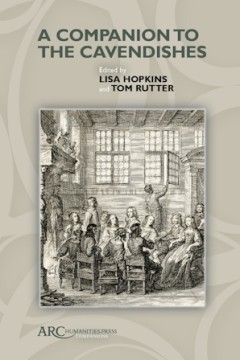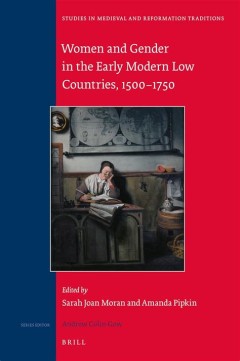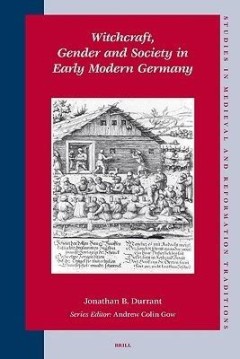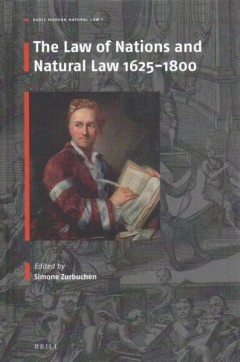Filter by

A Companion to the Cavendishes
"The noble Cavendishes were one of the most influential families in the politics and culture of early modern England and beyond. A Companion to the Cavendishes offers a comprehensive account of the Cavendish family's creative output and cultural significance in the seventeenth century. It discusses the writings of individuals including William and Margaret Cavendish, and William's daughters Jan…
- Edition
- -
- ISBN/ISSN
- 9781641891783
- Collation
- 438 hlm
- Series Title
- -
- Call Number
- -

Women and Gender in the Early Modern Low Countries, 1500 - 1750
Women and Gender in the Early Modern Low Countries, 1500-1750 brings together research on women and gender across the Low Countries, a culturally contiguous region that was split by the Eighty Years' War into the Protestant Dutch Republic in the North and the Spanish-controlled, Catholic Hapsburg Netherlands in the South. The authors of this interdisciplinary volume highlight women’s experie…
- Edition
- -
- ISBN/ISSN
- 9789004391352
- Collation
- 346 hlm; ill., lamp.,
- Series Title
- Studies in Medieval and Reformation Traditions, Volume: 217
- Call Number
- -

Witchcraft, Gender and Society in Early Modern Germany
Recent witchcraft historiography, particularly where it concerns the gender of the witch-suspect, has been dominated by theories of social conflict in which ordinary people colluded in the persecution of the witch sect. The reconstruction of the Eichstätt persecutions (1590-1631) in this book shows that many witchcraft episodes were imposed exclusively ‘from above’ as part of a programme o…
- Edition
- -
- ISBN/ISSN
- 9789047420552
- Collation
- 316 hlm; ill., lamp.,
- Series Title
- Studies in Medieval and Reformation Traditions, Volume:
- Call Number
- -

Verse and Transmutation : A Corpus of Middle English Alchemical Poetry (Criti…
Verse and Transmutation: A Corpus of Middle English Alchemical Poetry identifies and investigates a corpus of twenty-one anonymous recipes for the philosophers’ stone dating from the fifteenth century. These were circulated and received in association with each other until the mid-seventeenth century, when a number of them appeared in Elias Ashmole’s Theatrum Chemicum Britannicum. These …
- Edition
- -
- ISBN/ISSN
- 9789004254831
- Collation
- 390 hlm; ill., lamp.,
- Series Title
- Medieval and Early Modern Philosophy and Science, Volume: 21
- Call Number
- -

Travelling Chronicles: News and Newspapers from the Early Modern Period to th…
Travelling Chronicles presents fourteen episodes in the history of news, written by some of the leading scholars in the rapidly developing fields of news and newspaper studies. Ranging across eastern and western Europe and beyond, the chapters look back to the early modern period and into the eighteenth century to consider how the news of the past was gathered and spread, how news outlets gaine…
- Edition
- -
- ISBN/ISSN
- 9789004362871
- Collation
- 408 hlm; ill., lamp.,
- Series Title
- Library of the Written Word, Volume: 66 Library of the Written Word - The Handpress World, Volume: 66
- Call Number
- -

Topographies of Tolerance and Intolerance = Responses to Religious Pluralism …
Topographies of Tolerance and Intolerance challenges the narrative of a simple progression of tolerance and the establishment of confessional identity during the early modern period. These essays explore the lived experiences of religious plurality, providing insights into the developments and drawbacks of religious coexistence in this turbulent period. The essays examine three main groups of a…
- Edition
- -
- ISBN/ISSN
- 9789004371309
- Collation
- 278 hlm; ill., lamp.,
- Series Title
- Studies in Central European Histories, Volume: 64
- Call Number
- -

The Quest for an Appropriate Past in Literature, Art and Architecture
This volume explores the various strategies by which appropriate pasts were construed in scholarship, literature, art, and architecture in order to create “national”, regional, or local identities in late medieval and early modern Europe. Because authority was based on lineage, political and territorial claims were underpinned by historical arguments, either true or otherwise. Literature, s…
- Edition
- -
- ISBN/ISSN
- 9789004378216
- Collation
- 820 hlm; ill., lamp.,
- Series Title
- Intersections, Volume: 60
- Call Number
- -

The Production of Knowledge of Normativity in the Age of the Printing Press =…
This volume explores the production of knowledge of normativity in the age of early modern globalisation by looking at an extraordinarily pragmatic and normative book: Manual de Confessores, by the Spanish canon law professor Martín de Azpilcueta (1492-1586). Intertwining expertise, methods, and questions of legal history and book history, this book follows the actors and analyses the factors …
- Edition
- -
- ISBN/ISSN
- 9789004687042
- Collation
- 452 hlm; ill., lamp.,
- Series Title
- Max Planck Studies in Global Legal History of the Iberian Worlds, Volume: 4
- Call Number
- -

The Lead Books of the Sacromonte and the Parchment of the Torre Turpiana: Gra…
The Archive of the Sacromonte Abbey in Granada preserves a historical treasure: Arabic texts on a sheet of parchment and on numerous small tablets of lead, which were discovered in Granada at the end of the sixteenth century in the tower of the old Friday Mosque and in caves of the "Valparaíso" hillock, from then on called "Sacromonte". They became the object of heated discussions in Europe an…
- Edition
- -
- ISBN/ISSN
- 9789004685277
- Collation
- 617 hlm; ill., lamp.,
- Series Title
- Texts and Sources in the History of Religions
- Call Number
- -

The Law of Nations and Natural Law 1625–1800
The Law of Nations and Natural Law 1625-1800 offers innovative studies on the development of the law of nations after the Peace of Westphalia. This period was decisive for the origin and constitution of the discipline which eventually emancipated itself from natural law and became modern international law. A specialist on the law of nations in the Swiss context and on its major figure, Emer …
- Edition
- -
- ISBN/ISSN
- 9789004384200
- Collation
- 348 hlm; ill., lamp.,
- Series Title
- Early Modern Natural Law: Studies & Sources
- Call Number
- -
 Computer Science, Information & General Works
Computer Science, Information & General Works  Philosophy & Psychology
Philosophy & Psychology  Religion
Religion  Social Sciences
Social Sciences  Language
Language  Pure Science
Pure Science  Applied Sciences
Applied Sciences  Art & Recreation
Art & Recreation  Literature
Literature  History & Geography
History & Geography